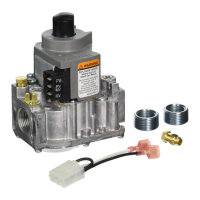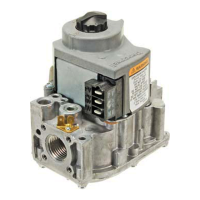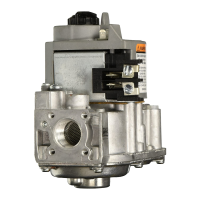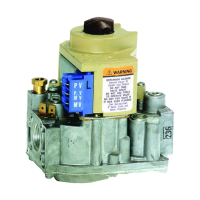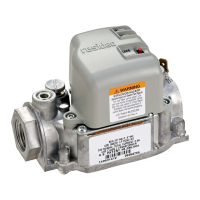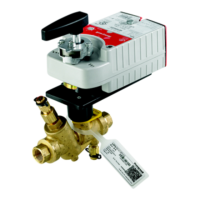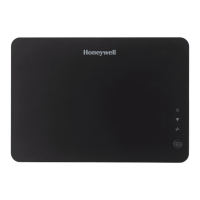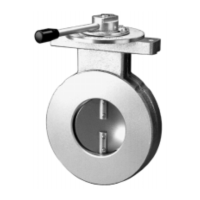TABLE 5—PRESSURE REGULATOR SPECIFICATION PRESSURES IN INCHES WC.
Outlet Pressure
Nominal Factory
Nominal Inlet Setting Setting Range
Type of Pressure Full Full
Model Gas Range Step Rate Step Rate
Standard-, Natural 5.0 - 7.0 — 3.5 — 3.0 - 5.0
Slow-opening LP 12.0 - 14.0 — 10.0 — 8.0 - 12.0
Step- Natural 5.0 - 7.0 0.9 3.5 — 3.0 - 5.0
opening LP 12.0 - 14.0 2.2 10.0 — 8.0 - 12.0
TABLE 6—PRESSURE REGULATOR SPECIFICATION PRESSURES IN kPa.
Outlet Pressure
Nominal Factory
Nominal Inlet Setting Setting Range
Type of Pressure Full Full
Model Gas Range Step Rate Step Rate
Standard-, Natural 1.2 - 1.7 — 0.9 — 0.7 - 1.2
Slow-opening LP 2.9 - 3.9 — 2.7 — 2.0 - 3.0
Step- Natural 1.2 - 1.7 0.2 0.9 — 0.7 - 1.2
opening LP 2.9 - 3.9 0.9 2.7 — 2.0 - 3.0
c. Always replace the cap screw and tighten firmly to
ensure proper operation.
4. If the desired outlet gas pressure or gas flow rate
cannot be achieved by adjusting the gas control, check the
gas control inlet pressure using a manometer at the inlet
pressure tap. If the inlet pressure is in the normal range
(refer to Table 5 or 6), replace the gas control. Otherwise,
take the necessary steps to provide proper gas pressure to
the gas control.
Step-Opening Pressure Regulator
1. The gas control outlet pressure should match the
manifold pressure listed on the appliance nameplate.
2. With the main burner operating, check the gas con-
trol flow rate using the meter clocking method or check the
gas pressure using a manometer connected to the gas
control outlet pressure tap. Refer to Fig. 1.
3. If necessary, adjust the pressure regulator to match
the appliance rating. Refer to Table 5 or 6 for factory set
nominal outlet pressures and adjustment ranges.
a. Remove the pressure regulator adjustment cap screw.
b. Using a screwdriver, turn the inner adjustment screw
clockwise to increase or counter-
clockwise to decrease the main burner gas pres-
sure.
c. Always replace the cap screw and tighten firmly to
ensure proper operation.
4. If desired outlet pressure or flow rate cannot be
achieved by adjusting the gas control, check the inlet
pressure using a manometer at inlet pressure tap or up-
stream of the gas control. If the inlet pressure is in the
normal range (refer to Table 5 or 6), replace the existing gas
control. Otherwise, take the necessary steps to provide
proper gas pressure to the gas control.
5. Carefully check main burner lightoff at the step
pressure. Ensure the main burner lights smoothly and
without flashback to the orifice and that all ports remain lit.
Cycle the main burner several times, allowing at least 30
seconds between cycles for the regulator to resume the step
function. Repeat after allowing main burner to cool. Read-
just the full rate outlet pressure, if necessary, to improve
lightoff characteristics.
CHECK SAFETY SHUTDOWN PERFORMANCE
WARNING
FIRE OR EXPLOSION HAZARD
CAN CAUSE PROPERTY DAMAGE,
SEVERE INJURY, OR DEATH
Perform the safety shutdown test any time work is
done on a gas system.
NOTE: Read steps 1-7 below before starting and compare
to the safety shutdown or safety lockout tests recom-
mended for the direct ignition (DI) module. Where they
differ, use the procedure recommended for the module.
1. Turn gas supply off.
2. Set thermostat or controller above room temperature
to call for heat.
3. Watch for ignition spark or for glow at hot surface
igniter either immediately or following prepurge. See DI
module specifications.
4. Time length of igniter operation. See DI module
specifications.
5. After the module locks out, open gas control and
ensure there is no gas flow to main burner.
6. Set thermostat below room temperature and wait one
minute.
7. Operate system through one complete cycle to en-
sure all controls operate properly.
!
7 69-0626—2
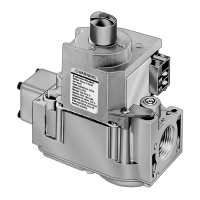
